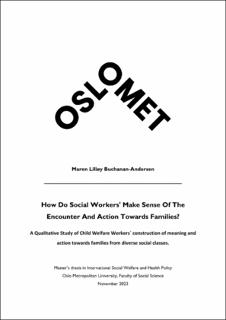| dc.description.abstract | Traditionally, research has focused on financial constraints as a risk factor for neglect within a family, thereby explaining the overrepresentation of low-class families in child welfare service. This thesis aims to contribute to the less-explored research field by examining the dynamics and implications of social class within the child welfare system. The objective of the thesis is to explore the interpretations and experiences of child welfare workers when encountering families from different socio-economic backgrounds and how it affects their actions. In light of this, the thesis ́ objective is the following question: How does the client's social class affect the meaning making and action of the social worker?
Data collection consists of vignettes as the initial framework of six semi-structured interviews with caseworkers from the child welfare system. The thematic analysis shows that the caseworkers' interpretations and action towards the clients are connected to three overarching themes. The themes concern: 1. Making sense of the families, 2. The caseworkers ́ perception of self and 3. The impact of the meaning-makings on the caseworkers ́ action.
This thesis findings indicates that the social class of the clients may affect the meaning- making, and as a result the action of the social workers. The low-class families were portrayed as inarticulate, not ethnic Norwegian, motivated and willing to get help but also afraid of the potential consequences of saying no. The construction of meaning about low-class families, led the caseworker to assume the need for taking a larger role and led the families to more often accepting assistance, while also being afraid to decline it. In contrast high-class families were depicted as articulate, well-educated, typically ethnically Norwegian, assertive of their rights, and resourceful. This made the caseworkers according to their own perception, feel they were in a subordinate position. As a result, child welfare workers reported that they engaged in more rounds of discussions and simultaneously became uncertain about how much they could push, which, in turn, led to more cases being dismissed. | en_US |
